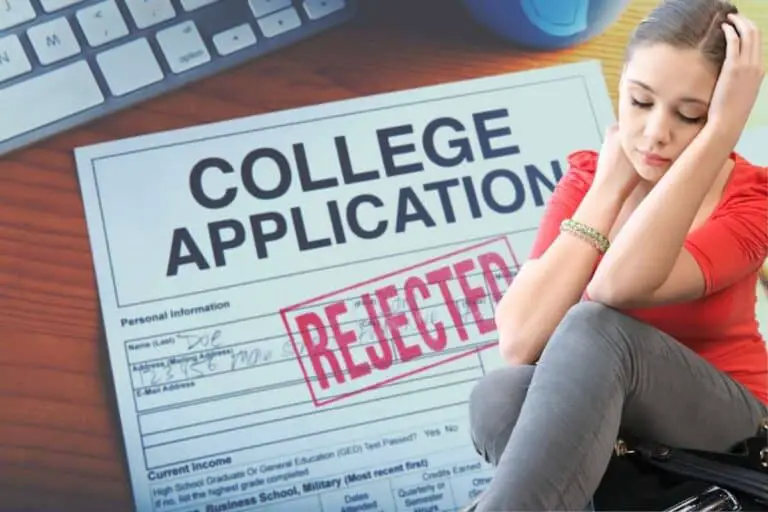Why Are Universities So Hard To Get Into?
The university admissions process is a procedure that transforms itself each passing year, introducing new challenges and difficulties to each generation of high school seniors. This is why you may be finding it much harder to navigate this process compared to your parents, who might have easily gotten into one of their top-choice schools through a well-written admissions essay.
Universities are so hard to get into due to the increased number of students applying, a more level playing field between higher-income and lower-income students, and universities trying to improve their rankings.
In this article, I’ll take you through some of the main reasons why most universities are becoming hard to get into, along with tips on how to increase your chances of getting accepted.

Reasons Why Most Universities Are So Hard To Get Into
In the same time frame that application numbers to some top universities have skyrocketed by up to 50%, average admission levels have decreased by 61.5%. These percentages speak for a heightened level of selectivity, making it harder for the average student to get into the university of their choice each passing year (source).
Several factors have contributed to this increased level of competition and, in turn, pressure to outperform your peers. Let’s take a look at them now.
The Necessity of a Degree
While five or six decades ago, a high school graduate could probably get a decent-wage job offering adequate financial security for them and their future families, doing so now is near-impossible.
Even most entry-level, minimum-wage jobs today require a college education, which means that more and more students feel pressure to pursue higher-level education.
This means that while getting into college was more of an individual choice in the past, today, it’s a necessity. Therefore, the number of applicants has skyrocketed, but this trend isn’t isolated in the US, as many international students are feeling this pressure as well.
The increased competition pushes these international students to seek the best university education they can, leading to a high influx of international high school seniors applying to American universities.
As you can imagine, this significant increase in applicants will negatively affect each individual’s chances to get into their school of choice.
This happens because as much as universities can expand within a limited amount of time, their places are still limited, meaning that they can accommodate a smaller percentage of the increased number of applicants each year.
For this reason, the higher-than-ever number of high school students seeking higher education has made the admissions process much more challenging and competitive, meaning that students will have to work much harder to get into their school of choice.
The Common Application
The common application has also led to an increased number of high schoolers applying to college, making the process much easier and quicker. By writing a single short essay, students today can apply to as many universities as they want as long as they pay a small fee for each application (source).
As you can imagine, a nervous high school senior worrying about whether they’ll get to seek their degree of choice or not will apply to as many schools as possible, rendering the selection process much more competitive.
Up to 1975, high schoolers had to fill out unique applications with different deadlines and write lengthy essays following specific instructions for each institution they wanted to apply to. Therefore, it comes as no surprise that the much more convenient approach followed today encourages more and more students to make themselves part of the increasing competition (source).
More Access to High-Level Test Prepping
Today high-level test prep for the ACT and SAT is available to all students for free.
For this reason, preparing for these important standardized tests is no longer a privilege reserved for students coming from higher-income families (source).
Furthermore, given that students today can find unlimited resources and pointers online at any time, it has given more applicants a distinctive competitive edge. This means that the number of students with excellent performances is getting higher by the day, another factor that highly affects competitiveness.
College Rankings
The increased level of competitiveness doesn’t only affect students but universities as well.
All the previous factors that I’ve mentioned have led to colleges gradually decreasing their acceptance rates in proportion to their demand.
Although this phenomenon might be worrisome for students, universities seek to further expand this gap. Doing so will make them seem more selective, helping them reach a higher ranking and prestige, ultimately increasing their fees.
This is why these institutions actively try to maximize the number of applicants.
How To Increase Your Chances of Getting Into a University
Even though you’re navigating a very competitive and complex space when applying for your university of choice, the good news is you also have much more resources than previous generations to optimize your chances. Therefore, start your preparation process early, try to get the highest grades you can, and follow these additional tips to have the best chances of getting into your dream school.
Review and Scrub Your Social Media Profiles
This is one of the most overlooked aspects of college applications which costs many students their spot.
Most universities will research you before offering you a seat in their classroom. Therefore, it might be wise to forestall this process by googling yourself and deleting any posts or pictures that can be damaging to your image.
Similarly, you can opt to make your personal social media profiles private.
Don’t Take On Too Many Extracurriculars
Although showcasing your enthusiasm and hobbies can be beneficial, after a certain point, it might look like you’re trying too hard to add fluff to your resume. Therefore try to pick beforehand a handful of extracurricular activities that you think can help you get into the university you want, and go on from there.
Research the Universities You’re Applying To
Universities will gravitate towards applicants that match their values and point of view. Without knowing what these institutions are looking for, you won’t be able to deliver a persuading application. Therefore researching and gathering information about your school of choice beforehand is crucial in bettering your chances of acceptance.
Ask for Letters of Recommendation
Enthusiastic letters of recommendation from teachers, employers, or colleagues can go a long way in a university application. Given that today’s climate is so competitive, being an excellent student doesn’t suffice anymore.
Most colleges are looking for a reliable, well-rounded individual, and a good letter of recommendation can help immensely in backing that up.
Conclusion
Although getting accepted into a university is much more challenging today, there are still many ways to optimize your chances of getting into your dream school. Most importantly, be patient throughout the whole process and don’t give up even if you’re waitlisted.
Recommended Reading:



![Is Khan Academy a Scholarly Source? [Solved]](https://campusleaders.org/wp-content/uploads/2021/10/khan-academy-as-a-scholarly-resource-768x512.jpg)



